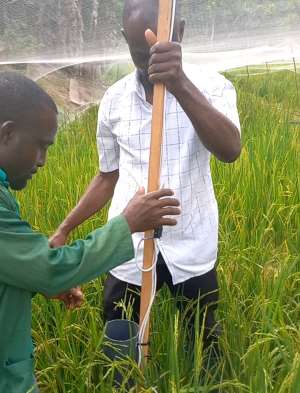
A team of research scientists from the Council for Scientific and Industrial Research (CSIR)-Crops Research Institute has developed a soil water monitoring device that can automatically detect the level of water in soil for farmers.
According to a Senior Research Scientist and member of the research team, Dr. Stephen Yeboah, the gadget will aid farmers in water table observations for efficient irrigation scheduling in lowland rice production.
A Senior Research Scientist and Soil and Water Engineer who led the research team has named the device AWaTA, an acronym for Automated Water Table Alert.
Dr. Patricia Amankwaa- Yeboah said the device uses a pani-pipe installed with a float valve and a lighting device that automatically illuminates once the water table drops to a level that calls for irrigation.
Dr. Amankwaa- Yeboah explained that using the AWaTA to monitor and schedule irrigation can help the farmers reduce water usage by 30 to 40 percent.
She told farmers that the AWaTA device is easy to use by both literate and illiterate as it is easy to install and read.
Speaking at a field day organized by the CSIR- Crops Research Institute at Aframso in the Ejura Municipality of the Ashanti Region, Dr Amankwaa-Yeboah disclosed that the device was developed following calls from farmers applying the water saving alternate wetting and drying technology in rice farming across the country.
She stressed that interactions with rice farmers on the research project has revealed that manual calculation of water table level to inform irrigation frequency is time consuming on the field, making the technology less attractive to using the technology.
Dr. Amankwaa further pointed that the team managed to co-design and re-design the water table cylinders previously used in the implementation of the alternate wetting and drying technology into an automated system which did not require constant monitoring and attention outside research activities of the GCRF AgriFood Africa Innovation Awards Round 2 funded project.
The alternate wetting and drying technology were first evaluated and promoted in Ghana under a GCRF funded project called Recirculate which was led by Lancaster University, UK with the CSIR- Crops Research Institute leading the Water for Food Work Package in Ghana.
Briefing farmers at the field day event, the Director of the CSIR- Crops Research Institute, Prof. M. B. Mochiah assured the farmers that scientists working together with them to co-develop agricultural technologies to make agricultural production system more efficient, less stressful and productive.
He encouraged farmers to continue to give work with and give research scientists the needed support and feedback in the development of agricultural technology in the country.
Prof Mochiah also appealed to the private sector to partner with research in commercializing research outputs to make them available to end-users for greater impact.




 Akufo-Addo spotted ordering chiefs to stand for his handshake
Akufo-Addo spotted ordering chiefs to stand for his handshake
 Akufo-Addo ‘disrespects’ every chief in Ghana except Okyenhene — NDC Communicato...
Akufo-Addo ‘disrespects’ every chief in Ghana except Okyenhene — NDC Communicato...
 Supreme Court clears way for dual citizens to hold key public positions
Supreme Court clears way for dual citizens to hold key public positions
 Be transparent, don’t suppress the truth – Prof. Opoku-Agyemang to Jean Mensa
Be transparent, don’t suppress the truth – Prof. Opoku-Agyemang to Jean Mensa
 ‘I won’t tell the world I was only a driver’s mate during challenges’ – Prof Jan...
‘I won’t tell the world I was only a driver’s mate during challenges’ – Prof Jan...
 We’ll prosecute corrupt officials of Akufo-Addo’s govt – Prof Jane Naana
We’ll prosecute corrupt officials of Akufo-Addo’s govt – Prof Jane Naana
 [Full text] Acceptance speech by Prof Jane Naana Opoku-Agyemang as 2024 NDC Runn...
[Full text] Acceptance speech by Prof Jane Naana Opoku-Agyemang as 2024 NDC Runn...
 Election 2024: Don’t be complacent, we haven’t won yet – Asiedu Nketia cautions ...
Election 2024: Don’t be complacent, we haven’t won yet – Asiedu Nketia cautions ...
 Election 2024: Stop fighting over positions in Mahama’s next govt – Asiedu Nketi...
Election 2024: Stop fighting over positions in Mahama’s next govt – Asiedu Nketi...
 Prof Jane Naana Opoku-Agyemang will restore dignity of vice presidency – Fifi Kw...
Prof Jane Naana Opoku-Agyemang will restore dignity of vice presidency – Fifi Kw...
